
Children of the Fatherland: MP conversion game
- Thread starter King of Men
- Start date
-
We have updated our Community Code of Conduct. Please read through the new rules for the forum that are an integral part of Paradox Interactive’s User Agreement.
You are using an out of date browser. It may not display this or other websites correctly.
You should upgrade or use an alternative browser.
You should upgrade or use an alternative browser.
Treaty of Alexandria
The Roman Empire's {GERM} vassal Tunis {DTUN} to be made a vassal of the Caliphate {FATI}
The Caliphate recognizes the Roman Empire as Rightful Protector of the Christian sites and people of the Holy Land.
Jerusalem's moslem title {MJER} to be transfered to the Empire {GERM}
(Jerusalems primary title will have to be changed from {MJER} to {PALE} and related changes so it remains a vassal of the Caliphate {FATI} )
Giant solid gold Hookahs for after treaty party paid for by Rome. (-250 gold to Raimond id = 16971)
Signed on behalf of Augustus Raimond VI de Toulouse
fasquardon
Signed by the Calipha
Giant solid gold Hookahs
Shishas! They shall get the Calipha in a better mood after the international community shut down his gambling operations.
Second Treaty of Anhalt
Lotharingia (OTTO) and the Roman Empire (GERM) hereby exchange Bologna (C352), the vassals of Neuchatel (C241) and Ulm (C252) for Pfalz (C124) and the vassal of Mainz (C123)
Alcohol consumed during treaty negotiations paid for by Rome. (-250 gold to Raimond id = 16971)
Signed on behalf of Augustus Raimond VI de Toulouse
fasquardon
Signed by Rupprecht I von Goldstrand
I'd like to suggest that treaties should, at a minimum, be copied to the edit-request thread; and further, it might be better if the "signed by X" posts were made there as well. Thus we avoid cluttering this thread, and I don't have to check two places for what edits to make.
The Fatimid Caliphate: The 7 triumphs of Ala'i


Long did the weak of faith lament the Rising against the old Fatimid Caliphas, a final nail in the coffin of the light of Ali said they. Broken asunder had the Caliphate been, ravaged by Greeks, Persians, Moroccans and wild Amazons from beyond the very ends of civilization. Like vultures every army in Europe had been drawn to feast on the corpse of the Caliphate. Now their cries had been silenced by the mighty actions of one man.

While later sources would come to celebrate the competence of the Fatimid bureaucracy and military commanders, as well as his willingness to give power to those who best deserved it, rather than the Calipha himself it remains that Calipha Ala'i was the most renowned man of his time. Already at the end of his teens He had crushed the Al-Murabit Sultanate, eviscerated the Sicilian Crusade and humbled Byzantium.
His first triumph was one of almost impious diplomacy, at the young age of 14 he had decided to mark his coronation with a hajj to Mecca. As benefiting the Calipha of all Moslemdom he of course traveled with an entourage, but while most other rulers on hajj would have chosen servants and noblemen showing of their lavish wealth for such a pilgrimage the Calipha felt a more tactful and austere display was called for. He therefore chose to only include his personal Sayeedi bodyguard.

The Sayeedi guard of course consisted of 7000 of the most feared heavy cavalry in the known world, and the Calipha commanded them from a 12 feet tall Indian warbeast, but no one had ever accused the Fatimid Caliphas of being subtle...
The Mullahs could not deny the Calipha entry on a hajj without sparking a war and so were forced to watch as Ala'i entered in triumph. What followed his entry of this most holy of places was a 10 hour long debate on the nature of Allahs representative on earth, for the mullahs had claimed that no man is infallible and pledged their allegiance to foreign masters to avoid the Caliphas wrath. Grand Mullah Galmel al-Evainen called him an heartless usurer and others implicitly questioned the legitimacy of the younger Fatimid branch.
The Calipha then asked them "Who held the title of Emir al-Mu'minin?", "The Caliphas" they answered.
"And you are faithful moslems?" he asked, "Certainly it is so" they answered.
Lastly he asked, "Am I the Calipha?". At this they dared not answer no, and so had to submit. To protect the the Holy City from robbers and the like an entire Banner of Sayeedi Guardsmen was quartered in the city.

The Mullahs were none to happy over this development.
The Second triumph proved somewhat less arduous, the wayward Emir of Jerusalem had again switched allegiances after the Abbasid Sultanate of Baghdad ran into internal troubles. In his wish to avoid outside meddling he submitted his tribute to the Andalusi al-Murabits, unfortunately for him this meant they had to traverse the Mediterranean to reinforce the Jerusalemites. When Sultan Tasifuhin landed the emirate was already in the hands of the Calipha, Alexandrian engineers having made mincemeat of the palisades that passed for 'fortifications' in the emirate. Seasick, unable to forage and trapped against the coast the Andalusis were swept aside in what can best be described as a largescale training exercise for the Egyptian recruits.
The Third triumph started on a somewhat lower note, with the declaration of the Sicilian Crusade. Crusades were nothing new to the Caliphate, in fact since the Pope declared Alexandria a primary target for the Wars of Faith there had been 14 launched by various Kings and Emperors. The difference now lay in the fact that the Normans had inflicted one of only two defeats in the history of the Younger Caliphate with the loss of the Bastion of the West; Palermo. It was therefore all the Banners of the Nile were mobilized as one, and sail set for Sicily. It was left for the Emirs of Damascus, Aleppo and Edessa to receive the hammer blow of the Hauteville landings in Jerusalem. While such cities would indeed have been able to muster an impressive force fate had wrested them from the Caliphate and none of the Emirs actually held the capitals of their Emirates, lacking thusly in number they managed only to fight the Neapolitan king to a bloody standstill outside Acre.
The decisive battle however fell outside Siracusa, were a sizeable but disorganized force of Norman knights, Greeks, Italians and some Arabs was outmaneuvered by the lighter forces of the Caliphate. The ability of lesser commanders to act independently under a larger plan yet again proving hard to match by Christian forces who had to await orders from a King or charged impetuously without concern for their neighboring units. Notable was the effectiveness of the Caliphas new Lancers maneuvering around the heavier Norman Cavalry.

The Victory in Sicily meant the Caliphate now controlled virtually all trade in the Eastern Mediterranean, and the end of Naples as a power of consequence.
The Fourth, Fifth and Sixth Triumphs came with the Great Raid on Palmyra by 500 Greek Cavalry led by none other than Malkhaz Komnenus, son of Prince Arkaidos of Antioch, Aleppo and Edessa. Ala'i was no fool, this was reconnaissance in force no matter what the greek envoys said. It was thus that he called for every banner in the realm to immediately engage the Greeks at every front and opportunity. By this decentralized assault the Greeks, whose armies were still being marshaled when the raid took place, were taken back footed. Baalbek, the spiritual home of the engineers and siegemasters was taken without a fight. Edessa, the greatest fortification outside Constantinople herself, was stormed after hassassins had poisoned the garrison. When the northern Themes arrived only 5 days after the raid the Emerald Banner already flew atop the main citadel, and at this they were much disheartened.
Many confusing battles raged all over Syria when the main Caliphate force consisting of the Banners of the Nile, the Deserts, Jerusalem and the Guard faced the Themes of Antioch and Aleppo, numbering some 25.000 on each side. The Komnenids however were not some ill organized catholics or malnourished Andalusis. No, what the Calipha faced was the same Antiochene Kataphraktoi who had held back the Turks at Manzikert, singlehandedly held together Byzantion against rebellion and swept the Caliphate from Syria not a decade ago. What the Calipha had was the Sayeedi Guard Banners, and specifically the Lancers specifically raised and trained to take and dismantle the Antiochene charge.

The battle of Aleppo was decided mainly by the decentralized light cavalry battles on the southern flank, but the final victory came at far to high a cost
The Caliphate victory came at what later scholars have dubbed 'ridiculous' costs, while the Guard was indeed able to outflank the Antiochene Cavalry charge the Lancers who received it were all but annihilated. Realizing their outflanked position untenable the Kataphraktoi and the bulk of the army was able to withdraw in good order and with colors intact. The Fatimids had been unable to dissemble the Greek order of battle as they had with the western crusaders and the Calipha began to doubt if he would be able to force the Greeks to term. The commander of Aleppo however saw things differently and opened the gates to the Calipha. Hearing of the fall of Edessa and Aleppo and the apparent defeat of the Komnenid Themes the Emperor lost heart and petitioned for peace, which was enthusiastically accepted on the Fatimid side, as the Banners of the entire realm were all but depleted.
The Seventh Triumph was less bloody. Seeking to assert themselves over all Italy, weaken the influence of their titular competitors the Greeks and secure the Mediterranean trade routes the Toulousian Emperors of Rome offered Tunis and Constantine to the Calipha in exchange for the Calipha not crossing the straits of Sicily and recognizing the Emperor as Protector of the Christian holy sites. For this reason some knights of good renown were allowed to be stationed in the emirate of Jerusalem to protect Christian pilgrims.

Although some gnashed teeth over letting infidels into the Caliphate after so many years of fighting to keep them out most praised the Calipha for having bought cities and riches for a fistfull of wind. The Emperor conversely was praised for taking with a piece of paper what all the Kings of Europe had been unable to capture with tens and thousands of knights and generations of conscripted peasants.
Last edited:
Great AAR, Frosty, but I have two criticisms: First, you consistently use 'where' for 'were'. Second, you have way too many apostrophes; neither "whose" nor "its" takes one. Please correct this, it is really distracting.
Antioch, the Beacon of Civilisation in the East
In these years, when Antioch was the bastion of Christianity in the East, when it stood alone against the heathen tide, holding a single fragile flame against the night - one might have expected it to be a grim fortress, barren stone and marching troops, with all its wealth going to its army. But such was not the case. Not only the finest soldiers, but also the best artists and the most erudite scholars flocked to Antioch, casting their defiance against the barbarian kingdoms of the East - and the West. There was, perhaps, a slightly febrile tone to the discussions, an apocalyptic note to the art; men who gather on the edge of a cliff to light fires and dance threats at powerful foes do not produce calm philosophy or paintings of pastoral landscapes. Nonetheless in these years Antioch became not only Christendom's bastion, but also its beacon; a lighthouse against the encroaching dark.
Drawing to itself the wealth and sophistication of Greek civilisation, the thematic court of Antioch was filled with luminaries, a near-embarrassment of riches; starting with Arkadios himself, whose brilliance lay in politics and intrigue, but extending down to all the great and many minor offices of the court. The outpouring of art and scholarship found its natural counterpart in diplomatic successes within the Empire, starting with the marriage of Arkadios to the daughter of heirless Emperor Leo. Although younger than Arkadios, the Emperor, disappointed in the deaths of his sons and his inability to stem the disintegration of his realm, seemed like much the older man. Thus his passing of the torch to the younger Komnenos dynasty, in the person of his grandson Thomas, may be deemed a fitting accompaniment to the movement of the center of Greek culture.
Some call it a blessing of the True God; but the honest philosophers of Antioch's court observe that randomness plays favourites, and where some people collect undeserved joys, others get no luck whatsoever. Perhaps there is balance in all things; if so, surely the Bagratuni dynasty is compensating for the rise of the Komnenoi. Zoe Kabakes has died, without getting her revenge - or, at any rate, it has yet to unfold. For in her declining years she forswore all vengeance and publicly forgave Arkadios - who perforce had to deny yet again that there was anything to forgive. Not that the denial did him any good; in the public mind, he is a killer of children, and that is that. What's more, for her words the Church has canonized Zoe. Not all vengeance is written in fire and blood; it may be, as the centuries pass, that Zoe will have had the best of the contest after all. But that is for the future. In the present day Zoe is dead and her bastard son David will never sit the throne of Georgia.
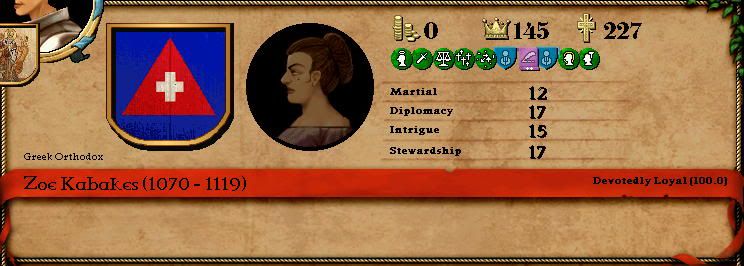
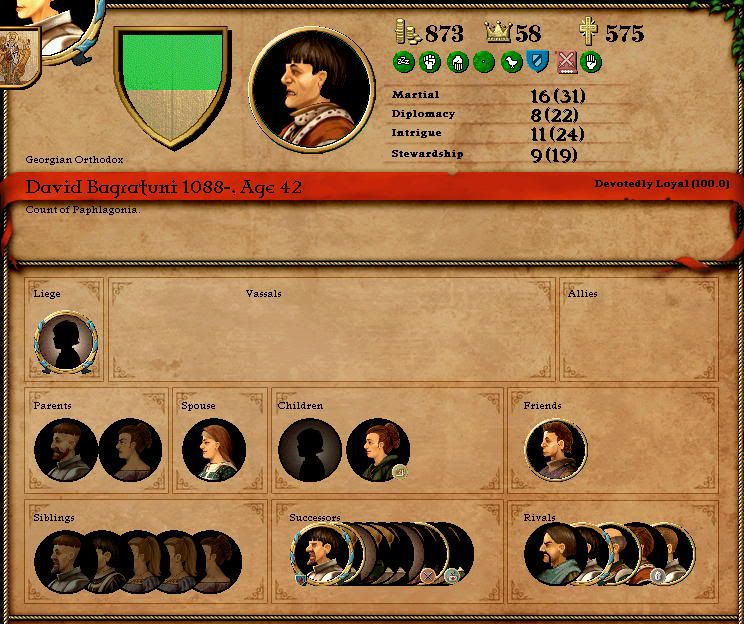
It is true that he has found a minor countship in inland Anatolia, a hardscrabble fiefdom of sheep and mountains; held, in defiance of Antioch's barricade, of the Persian throne. David is not the only minor Anatolian lord to have found a Persian sanctuary from the perennial civil war. But he is the only one to have come to the personal attention of Arkadios... and the only one whose title, passing back through his father Giorgi, would come to a Komnenoi scion - specifically, to his nephew Zenobios. And the only one whose son, also named Giorgi, is dead (so the bitter jest runs) of completely natural causes. In particular, what could be more natural than to die, when your heartbeat is all that stands in the way of a Komnenus inheritance? What could be more natural than to die, when someone puts strychnine in your oatmeal, ground glass in your milk, hemlock in your birthday cake? Why, to survive in such circumstances would violate the order of things! So the gallows-joke runs, in barren upland provinces of Anatolia, where no luck ever comes except it is bad.
In these years, when Antioch was the bastion of Christianity in the East, when it stood alone against the heathen tide, holding a single fragile flame against the night - one might have expected it to be a grim fortress, barren stone and marching troops, with all its wealth going to its army. But such was not the case. Not only the finest soldiers, but also the best artists and the most erudite scholars flocked to Antioch, casting their defiance against the barbarian kingdoms of the East - and the West. There was, perhaps, a slightly febrile tone to the discussions, an apocalyptic note to the art; men who gather on the edge of a cliff to light fires and dance threats at powerful foes do not produce calm philosophy or paintings of pastoral landscapes. Nonetheless in these years Antioch became not only Christendom's bastion, but also its beacon; a lighthouse against the encroaching dark.
Drawing to itself the wealth and sophistication of Greek civilisation, the thematic court of Antioch was filled with luminaries, a near-embarrassment of riches; starting with Arkadios himself, whose brilliance lay in politics and intrigue, but extending down to all the great and many minor offices of the court. The outpouring of art and scholarship found its natural counterpart in diplomatic successes within the Empire, starting with the marriage of Arkadios to the daughter of heirless Emperor Leo. Although younger than Arkadios, the Emperor, disappointed in the deaths of his sons and his inability to stem the disintegration of his realm, seemed like much the older man. Thus his passing of the torch to the younger Komnenos dynasty, in the person of his grandson Thomas, may be deemed a fitting accompaniment to the movement of the center of Greek culture.
Observe the brilliance, the education, the sheer magnificence of my court!
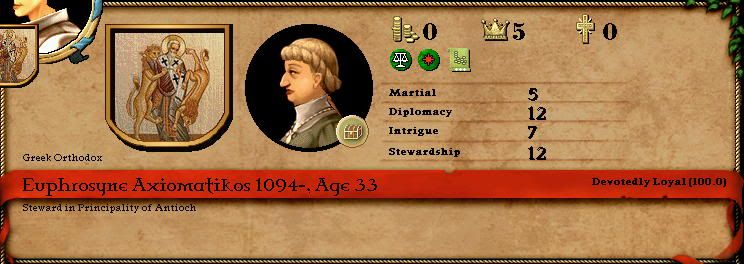
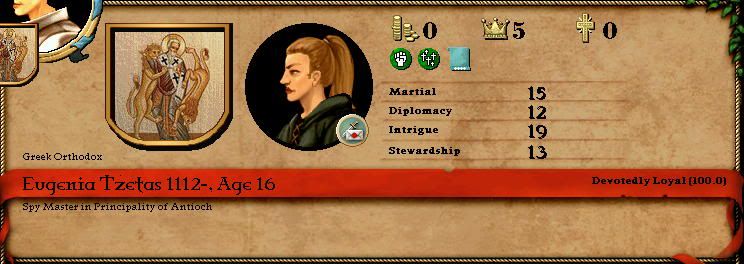
Although the Marshal, admittedly, would do better to concentrate on Vegetius and not Ovid.
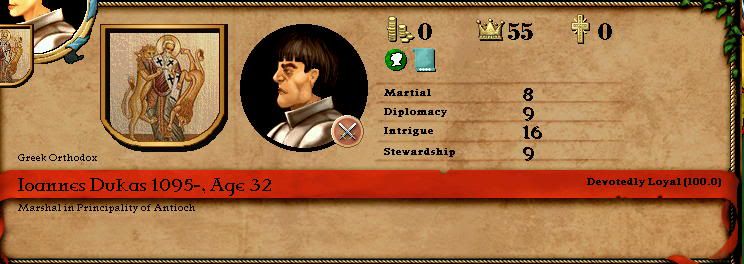
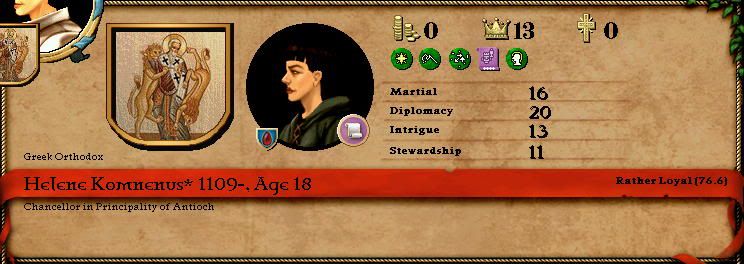
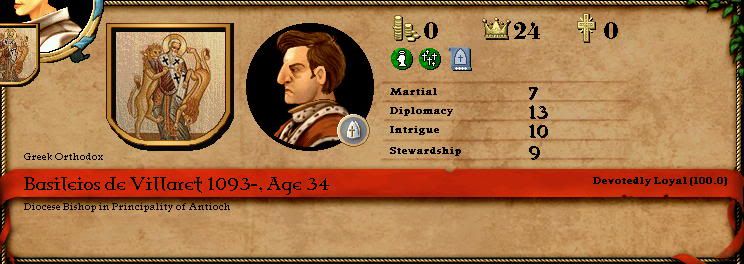
Observe also that they learn intrigue early in Antioch, as much as in Byzantium. Young Thomas is getting it with his mother's milk.
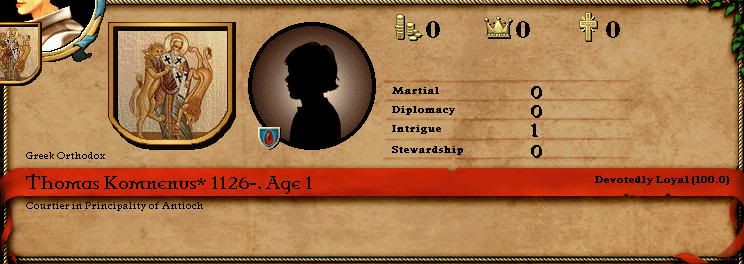


Although the Marshal, admittedly, would do better to concentrate on Vegetius and not Ovid.



Observe also that they learn intrigue early in Antioch, as much as in Byzantium. Young Thomas is getting it with his mother's milk.

Some call it a blessing of the True God; but the honest philosophers of Antioch's court observe that randomness plays favourites, and where some people collect undeserved joys, others get no luck whatsoever. Perhaps there is balance in all things; if so, surely the Bagratuni dynasty is compensating for the rise of the Komnenoi. Zoe Kabakes has died, without getting her revenge - or, at any rate, it has yet to unfold. For in her declining years she forswore all vengeance and publicly forgave Arkadios - who perforce had to deny yet again that there was anything to forgive. Not that the denial did him any good; in the public mind, he is a killer of children, and that is that. What's more, for her words the Church has canonized Zoe. Not all vengeance is written in fire and blood; it may be, as the centuries pass, that Zoe will have had the best of the contest after all. But that is for the future. In the present day Zoe is dead and her bastard son David will never sit the throne of Georgia.


It is true that he has found a minor countship in inland Anatolia, a hardscrabble fiefdom of sheep and mountains; held, in defiance of Antioch's barricade, of the Persian throne. David is not the only minor Anatolian lord to have found a Persian sanctuary from the perennial civil war. But he is the only one to have come to the personal attention of Arkadios... and the only one whose title, passing back through his father Giorgi, would come to a Komnenoi scion - specifically, to his nephew Zenobios. And the only one whose son, also named Giorgi, is dead (so the bitter jest runs) of completely natural causes. In particular, what could be more natural than to die, when your heartbeat is all that stands in the way of a Komnenus inheritance? What could be more natural than to die, when someone puts strychnine in your oatmeal, ground glass in your milk, hemlock in your birthday cake? Why, to survive in such circumstances would violate the order of things! So the gallows-joke runs, in barren upland provinces of Anatolia, where no luck ever comes except it is bad.
Family tree of David and Zenobios
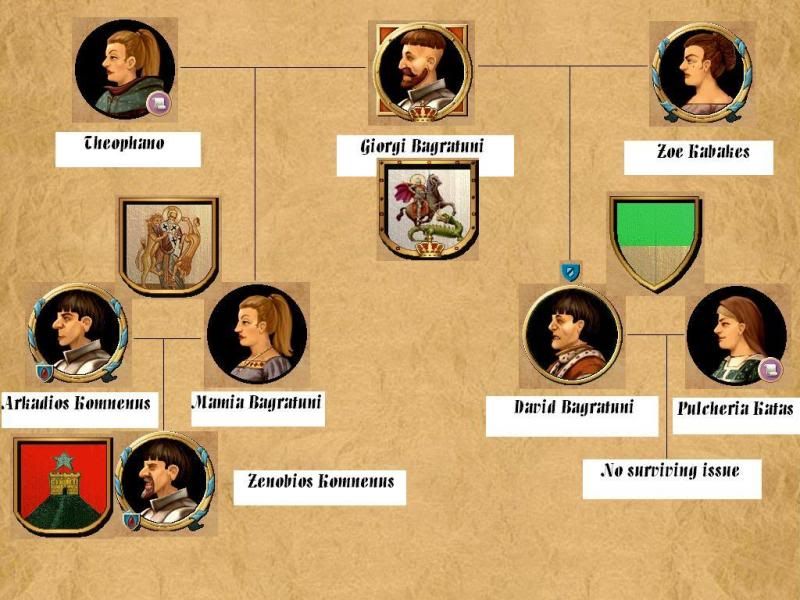

You aren't GM anymore.Great AAR, Frosty, but I have two criticisms: First, you consistently use 'where' for 'were'. Second, you have way too many apostrophes; neither "whose" nor "its" takes one. Please correct this, it is really distracting.
Great AAR, Frosty, but I have two criticisms: First, you consistently use 'where' for 'were'. Second, you have way too many apostrophes; neither "whose" nor "its" takes one. Please correct this, it is really distracting.
You should see what it looks like before I spellcheck!
You'd be surprised at how awful my English actually is.:rofl:
You aren't GM anymore.

But did you see his spymaster?! I had best do as he commands!
Last edited:
Excellent AARs both KoM and Frozenwall.
Though I admit i would like to see current map.
Though I admit i would like to see current map.
Excellent AARs both KoM and Frozenwall.
Though I admit i would like to see current map.
Why thank you. Remember peanuts: more praise = more aars
The maps back on the bottom of page 13 are still current, we just talk a lot. :wacko:
The Toulousian Codex:
1126-1131:
1126-1131:
Analysis of the Roman situation:
The main event for me this session was a war with AI Sicily (Beamed having stepped down). The war started because Sicily attacked Fatimid* Egypt, which acute observers will be noticing I've been helping regularly. As hoped, the entry of the Roman Empire drew off the main body of Sicilian troops, including their military genius king, Jordan, allowing Egypt to take most of Sicily and peace out at minimal cost. Unfortunately for me, it's no joke to fight a man with 22 martial in Central Italy, and many of my riches provinces have been quite comprehensively looted... But Jordan is one man, and the Roman Empire has more men than any power save Russia, the Northern vassals of Sicily have been snapped up, and I'm preparing to invade Southern Italy as I write.
Egyptian Fruit:
The policy of strengthening Egypt bore gratifying fruit when Egypt was able to not only fend off an Antiochene attack, but successfully take land off the Greek aggressor. Even more gratifying fruit came in the form of the title to the Duchy of Jerusalem and in character recognition of the de Toulouse Emperors as protectors of the Christian holy sites. (While Forsty has written this up in his AAR as an exchange in return for Tunis, OOC this was just him being nice to me.) And this sort of gift is the best sort of AAR goodness. This honorary title is sure to influence Imperial politics heavily - particularly relations with the Pope - watch this space.
The Enigmatic East:
Russia has almost completely recovered from its earlier implosion, and I'm starting to worry about what this means for the balance of power in the East - particularly with Persia at a low ebb, and a seemingly pro-Antiochene policy...
Antioch has put a heir in line to the Byzantine throne, and given KoM's aggressive policy towards me, that's a definite concern. For all that, I'm not sure if I want to turn said heir into a porcupine with Roman daggers - having KoM grow so weak in relative terms that he's out of the game would, after all, make things alot less interesting.
I'm starting to think of Persia as "the Yellow Peril" - not just because of their yellow colour on the map, but also because Foels is paranoia-inducingly quiet... I have no idea what Persia's goals or interests are, and no idea what Persian opinion is on Roman goals and interests.
Analysis of the Dynastic Glory:

As predicted, the Rurikovich* dynasty has re-entered the top 8, and is sitting just below me at number 4. Pretty darn good for a session they started still in negative DG. With a DG gain of close to 200,000 points, the Fatimid*s have replaced the Abbasid*s as the second most glorious dynasty. The real prize has to go to the Knautschling*s though. Gaining 470,000 DG in one session is... Scary!
Behind the scenes:
This session was much more stable, due in great part to our new host. Go go Orago!
fasquardon
Treaty of Orvasa
Croatia-Hungary (DCRO) and Poland (POLA) hereby exchange the Counties of Czersk (C530) and Sandomierskie (C531) in return for Orasa (C525).
Admission to the Komenoi tent on nights after the long treaty discussions paid for by Poland (-250 gold to Sieciech, id = 355041).
Signed by Teodosii Radomir, King of Croatia and Hungary.
Treaty of Orvasa
Croatia-Hungary (DCRO) and Poland (POLA) hereby exchange the Counties of Czersk (C530) and Sandomierskie (C531) in return for Orasa (C525).
Admission to the Komenoi tent on nights after the long treaty discussions paid for by Poland (-250 gold to Sieciech, id = 355041).
Signed by Teodosii Radomir, King of Croatia and Hungary.
Signed by Sieciech Tilus, King of Poland.
Session 9: Mare Demi-Nostrum! and The end of England!

Fault in map: Russian Brittany not shown (and was sold to Rome after the session!)
In this session:
Toledo Pledges to the Caliphate!
The Fatimid Caliphate fights of AI Hungary and AI Byzantium!
The Fatimid Caliphate FINALLY destroys Nubia!!
Rus helps Croatia take Hungary!
What will become of Poland?
AI France destroys England!
Gollevainen concedes game despite promises of reconstruction.
Rus and Lotharinga fight Denmark!
Denmark on the defensive
Baghdad recovers, but has no heirs!
There is an aar award to make your wife pregnant, now might be the time to use it...
The heir Antioch has maneuvered 1st in line to the throne of Byzantium grows up with some nice stats and no knives in its back!
(yet?)
Antioch asks what would happen if you should 'happen' to inherit another players realm. The Fatimid Caliphate threatens to burn Antioch to the ground if it finds any Komnenids in Toledos line of succession! or anywhere else in the Fatimid sphere of interest for that matter.

Fault in map: Russian Brittany not shown (and was sold to Rome after the session!)
In this session:
Toledo Pledges to the Caliphate!
The Fatimid Caliphate fights of AI Hungary and AI Byzantium!
The Fatimid Caliphate FINALLY destroys Nubia!!
Rus helps Croatia take Hungary!
What will become of Poland?
AI France destroys England!
Gollevainen concedes game despite promises of reconstruction.
Rus and Lotharinga fight Denmark!
Denmark on the defensive
Baghdad recovers, but has no heirs!
There is an aar award to make your wife pregnant, now might be the time to use it...
The heir Antioch has maneuvered 1st in line to the throne of Byzantium grows up with some nice stats and no knives in its back!
(yet?)
Antioch asks what would happen if you should 'happen' to inherit another players realm. The Fatimid Caliphate threatens to burn Antioch to the ground if it finds any Komnenids in Toledos line of succession! or anywhere else in the Fatimid sphere of interest for that matter.
Last edited:
Well Im not resigning due technical issues, but Becouse I lost fair figth against Denmark.
I also cannot accept really generous amnesty peace deal, and then start immediately plot against Denmark and redow him. My hounour just wont stand such.
But in the end, Wales and Ireland are too small base to someone share the isles so I wouldn't have any other alternatives but to seek ways to destroy Denmarks holdings there, and If I couldn't do them with even grand gangbang, then I cannot do them in otherways neither.
I'll inform you guys later wheter I continue somewhere else, or completely leave the campaing.
I also cannot accept really generous amnesty peace deal, and then start immediately plot against Denmark and redow him. My hounour just wont stand such.
But in the end, Wales and Ireland are too small base to someone share the isles so I wouldn't have any other alternatives but to seek ways to destroy Denmarks holdings there, and If I couldn't do them with even grand gangbang, then I cannot do them in otherways neither.
I'll inform you guys later wheter I continue somewhere else, or completely leave the campaing.
I'll inform you guys later wheter I continue somewhere else, or completely leave the campaing.
Well I certainly hope you'll at least be back for the EU III stretch?
I had the pleasure to lead mighty Persia spending most of my time crushing various rebelious movements inside my country, possibly because I dowed Russia due to ingame confusion regarding peace deal Foels and von r had engineered previously.
Still I got back southern Persia under its rightful ruler as well as most of the rebels, didnt finish it because of connectivity problem, so session went slightly better than I expected given my experience with CK.
edit: Yeah Golle dont quit completley, I sure hope to fight you in WW2 field of battle (preferably AoD)
Still I got back southern Persia under its rightful ruler as well as most of the rebels, didnt finish it because of connectivity problem, so session went slightly better than I expected given my experience with CK.
edit: Yeah Golle dont quit completley, I sure hope to fight you in WW2 field of battle (preferably AoD)

